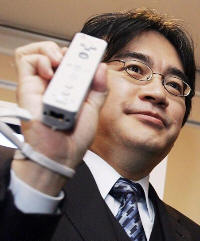 Nintendo’s President, Satoru Iwata, has presided over one of the most lucrative times in Nintendo’s history, as 2007 saw the Wii and DS selling at a greater pace than anyone could’ve predicted.
Nintendo’s President, Satoru Iwata, has presided over one of the most lucrative times in Nintendo’s history, as 2007 saw the Wii and DS selling at a greater pace than anyone could’ve predicted.
Naturally, Iwata had quite a lot to say in this interview, where he talks about many subjects, including Wii shortages, game development, the DS, Wii Fit, WiiWare and 3rd-party developers. Here’s some excerpts:
On Wii shortages:
. . . I’m sad to say that last year, production couldn’t even keep up with Japan, US, and Europe’s demands. The scarcity of Wii units in the US and Europe is particularly serious. This is a result of not being able to build up stock at all over the summer due to the consistently active demand for the Wii throughout the year. If we had branched out into new markets under these circumstances, we wouldn’t have been able to meet demand. That’s why the expansion into new regions will take place this year . . . Nintendo will work hard to ensure we increase production of the Wii . . .
On Game Development:
. . .Games that are easy to pick up and play have the possibility to appeal to new people and show them the fun and value of video games. They also have the benefit of allowing experienced gamers to play together with newcomers. That was really missing from the market before, and I think it needs to be there.
At the same time, Nintendo has teams working on meeting the needs of more hardcore gamers. The big complaint from them now may be that we’re not pouring all of our resources into that sector exclusively, but I feel that it’s Nintendo’s mission to make both kinds of games. Every experienced gamer today was a beginner at some point, who encountered an experience that made them fall in love with games.
I think it’s absolutely critical to keep that entryway open for new people. I think it’s really important to strike that balance between the two extremes . . .
. . . No matter how fun a game is when you first pick it up and play it, people eventually get bored. Our task is to come out with the next big thing before that boredom sets in, and to go beyond just releasing an extension of the current titles every three months . . .
. . . We’re constantly working on a variety of ideas for new, different games, but it’s only after the specifics have been nailed down and they’re ready to be announced that we can talk about them. So while I can tell you all about a project that we can have out within two months’ time, games that still need six months or a year’s work really have to be kept under wraps.
On the DS:
. . . I will say, though, that one of the lifestyle proposals we’d like to put into effect in the first half of this year is an experiment aimed at getting people to use their DS’s in public spaces as part of a larger effort to make the DS a more helpful tool for people in their everyday lives. It’s a portable, single-architecture platform that can receive anything given a Wi-Fi hotspot with over 20 million units in use in Japan and about the same amount in the US and Europe . . .
On Wii Fit:
Games that require expensive accessories, by conventional game industry wisdom, seem to be an obvious example for products that are least likely to succeed. But the fact that Wii Fit sold over a million copies in a little over a month is proof that we decided to make a million units before we sold a single one. [Laughter.] That’s the only way we could make it happen.
On WiiWare:
Well, the current state of affairs is that the Virtual Console saw over 10 million downloads by the end of last December. That’s the total number of titles people paid to download. I think that selling over 10 million classic games in that price range stands as proof that there are great possibilities with the download model. Since that’s the case, I feel that WiiWare is one answer to a lot of the problems that I perceived even back when I was still a developer myself.
However, I don’t think that packaged, retail games will be replaced by downloads over the next three-to-five-year cycle. Packaged games have a number of advantages, from the guarantee of a certain amount of sales volume to the firmly established buying habits and infrastructure that I think should be preserved in the future.
But packaged games aren’t a complete solution anymore. The cost of materials and distribution margins mean that there isn’t much price flexibility, and there’s always a risk with inventory. Plus the majority of a product’s lifespan ends within a very short period after its release in the current market, such that titles can no longer compete for shelf space a month after their release.
When making games, though, you come up with a lot of fun ideas that could sell for ¥500 yen (about $4.70). Well, if there were a forum for releasing that 500 yen single idea into the market now, maybe the idea would grow into something that could be used as a full packaged game in the future. That’s off in the future.
For me, the biggest reason for wanting to do WiiWare is to create an opportunity for new products to materialize by providing a forum where those products can be sold without having to compete in terms of size or name recognition, or be bound by inflexible prices or inventory risk.
I hope that WiiWare can act as a platform for that kind of an experience, but there are always people who suspect that WiiWare is all about cutting out the distributors. [Chuckles] I try to explain that that’s really not the case every opportunity I get.
On 3rd Party developers:
Every time someone points out to me that only Nintendo games are selling on the Wii, I remind them that the same thing was said for the DS. [Chuckles]
As the first party, our primary goal is to make software that people want to play so much that they purchase the hardware, so we were putting all of our efforts into that before the hardware was even released. It’s natural, then, that our title lineup still feels a bit more robust. We had to start off at full steam to establish the platform as something with enough of a market to make it worthwhile for other developers to come into.
Last year saw the ratio of DS software flip to the degree that even we were thinking, “Wow, Nintendo is kind of the second banana here.” It took almost two years for the DS to get to that point, and the Wii has only been out for a year. From here on, we’ll see more titles by third-party software makers that they’ve invested all their energy in, so I believe that with time, this problem will resolve itself. We’re also actively working to support these software makers to ensure that this problem will be resolved. It’s undeniably in the customers’ best interest for other creators with their own aesthetics to come in and make things that have us writhing around saying “Why didn’t we think of that?”
I’ll also mention that according to last December’s top 100 games data from the NPD Group, Wii titles are outselling Xbox 360 titles, and only five of the 20 Wii titles on the list were created by Nintendo, with the remaining 15 from third party developers. But even with those numbers there, that isn’t the impression you get. It feels like it takes a bit of time for popular perception to catch up to the actual sales figures. — read the full interview at GameSpot
